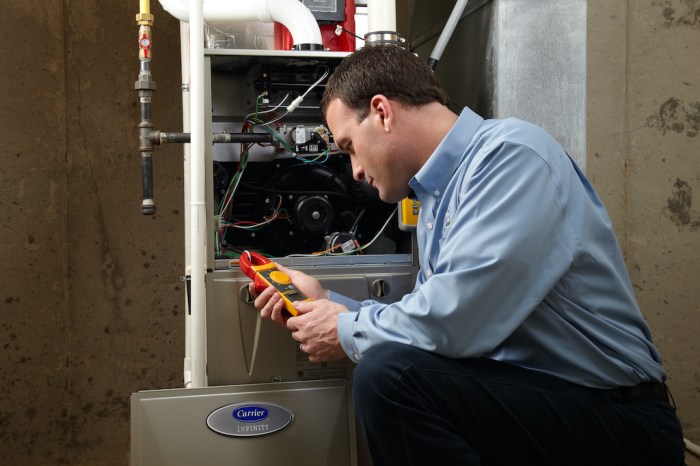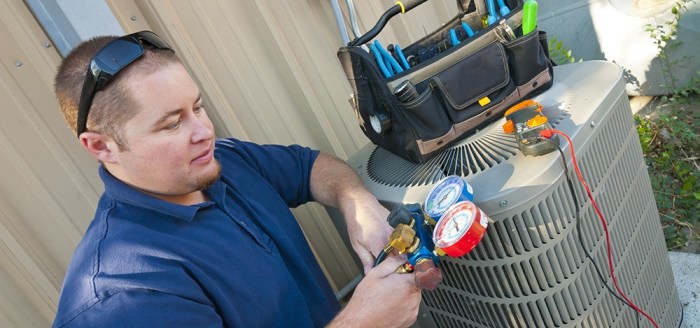Optimizing Your HVAC System: The Importance of AC and Furnace Tune-Up
As the seasons change and your HVAC system becomes a crucial part of your home, understanding the significance of regular AC and furnace tune-ups is paramount. This comprehensive guide delves into the essentials of maintenance, highlighting the benefits and consequences of neglect.
With a focus on efficiency and longevity, this exploration of AC and furnace tune-ups aims to empower homeowners with practical knowledge to keep their systems running smoothly.
Importance of AC and Furnace Tune-Up
Regular tune-ups are crucial for maintaining the efficiency and longevity of your AC and furnace systems. By scheduling routine maintenance, you can ensure that both systems operate at their best, providing optimal comfort and cost savings.
Benefits of Routine Maintenance
- Improved Efficiency: A well-maintained AC and furnace system can operate more efficiently, reducing energy consumption and lowering utility bills.
- Extended Lifespan: Regular tune-ups can help prevent major breakdowns and extend the lifespan of your HVAC systems, saving you money on costly repairs or replacements.
- Enhanced Comfort: Proper maintenance ensures that your AC and furnace can deliver consistent and reliable heating and cooling throughout your home.
- Improved Air Quality: Regular maintenance includes cleaning and replacing filters, improving indoor air quality and creating a healthier living environment.
Comparison of Well-Maintained Systems
Well-maintained AC and furnace systems operate smoothly, providing consistent performance and comfort. In contrast, systems that lack tune-ups may experience reduced efficiency, increased energy consumption, frequent breakdowns, and poor indoor air quality. By investing in routine maintenance, you can avoid these issues and enjoy the full benefits of a well-functioning HVAC system.
Frequency of Tune-Ups
Regular maintenance is crucial for the optimal performance and longevity of both your AC and furnace systems. Here, we will discuss the recommended frequency of tune-ups, factors that may influence how often they should be performed, and the consequences of neglecting these important tasks.
Recommended Frequency
- It is generally advised to schedule annual tune-ups for both your AC and furnace systems.
- Some HVAC professionals may recommend semi-annual tune-ups, especially in regions with extreme weather conditions.
Factors Influencing Frequency
- The age of your HVAC system can impact how often tune-ups are needed. Older systems may require more frequent maintenance to ensure they continue to operate efficiently.
- The usage of your AC and furnace also plays a role. Homes that run their systems frequently, such as those in very hot or cold climates, may benefit from more frequent tune-ups.
- If you have a warranty on your HVAC system, it may require annual maintenance to keep the warranty valid.
Consequences of Neglect
- Neglecting regular tune-ups can lead to decreased efficiency, higher energy bills, and a shorter lifespan for your AC and furnace.
- Failure to perform maintenance can also result in more frequent breakdowns and costly repairs down the line.
- Poorly maintained systems may struggle to keep your home comfortable, leading to uneven heating or cooling.
Components Checked During Tune-Up

During a routine AC and furnace tune-up, several key components are inspected to ensure optimal system performance and efficiency. Regular maintenance helps prevent breakdowns and prolongs the lifespan of your HVAC system.
AC Tune-Up Components:
- Thermostat calibration to ensure accurate temperature control.
- Cleaning or replacing the air filter for proper airflow and indoor air quality.
- Inspecting and cleaning the evaporator and condenser coils to improve cooling efficiency.
- Checking refrigerant levels and addressing any leaks to maintain peak performance.
- Examining the blower motor and fan for proper operation and airflow.
- Tightening electrical connections and lubricating moving parts to reduce wear and tear.
Furnace Tune-Up Components:
- Inspecting and cleaning the burners for efficient combustion and heat output.
- Checking the ignition system and ensuring proper functioning for reliable start-up.
- Examining the heat exchanger for cracks or damage to prevent carbon monoxide leaks.
- Lubricating the blower motor and fan for smooth operation and improved airflow.
- Testing safety controls to ensure the system shuts down properly in case of emergencies.
- Inspecting the flue pipe for proper ventilation and preventing carbon monoxide buildup.
Regular cleaning and servicing of these components not only improve the performance of your AC and furnace but also help reduce energy consumption and lower utility bills. By addressing minor issues before they escalate, you can avoid costly repairs and ensure your HVAC system operates efficiently year-round.
DIY Maintenance Tips

Regular maintenance is key to keeping your AC and furnace running smoothly. Here are some DIY tips to help you maintain your systems between professional tune-ups.
AC System Maintenance
- Regularly clean or replace air filters to ensure proper airflow and efficiency.
- Keep the outdoor unit free of debris such as leaves, dirt, and branches to prevent airflow blockages.
- Inspect and clean the evaporator and condenser coils to improve cooling efficiency.
- Check and clear the condensate drain to prevent clogs and water damage.
Furnace System Maintenance
- Replace or clean furnace filters every 1-3 months to maintain air quality and efficiency.
- Inspect and clean the blower assembly to ensure proper airflow and heat distribution.
- Check and adjust the thermostat settings for optimal heating performance and energy savings.
- Keep vents and registers clear of obstructions to maintain consistent heating throughout your home.
General Maintenance Tips
- Regularly check for unusual noises, odors, or performance issues and address them promptly.
- Monitor energy consumption and look for ways to improve efficiency, such as sealing duct leaks or upgrading insulation.
- Schedule professional maintenance at least once a year to ensure thorough inspections and tune-ups.
- Consider investing in a programmable thermostat to regulate temperature settings and save on energy costs.
Epilogue
In conclusion, prioritizing routine tune-ups for your AC and furnace not only ensures optimal performance but also extends the lifespan of your HVAC system. By staying proactive with maintenance, you can enjoy a comfortable home environment year-round.
FAQ Section
How often should I schedule AC and furnace tune-ups?
It's recommended to have your AC and furnace systems tuned up at least once a year to maintain peak performance.
What are the consequences of skipping regular tune-ups?
Neglecting tune-ups can lead to decreased efficiency, higher energy bills, and potential system breakdowns.
What components are typically checked during an AC tune-up?
Commonly inspected components include air filters, coils, refrigerant levels, and thermostat calibration.
Are there DIY maintenance tips for HVAC systems?
Homeowners can clean or change air filters, clear debris around outdoor units, and ensure proper insulation to maintain their systems between professional tune-ups.
How can regular maintenance extend the lifespan of AC and furnace systems?
By addressing issues promptly and keeping components clean, regular maintenance can prevent major breakdowns and help HVAC systems last longer.